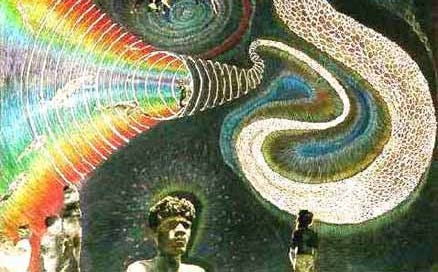"All you have to do is see the dream as dream."
— Nisargadatta Maharaj
Let’s begin with the bad news: You’re in prison.
Not a dramatic, stone-walled one. Not even a sci-fi supermax in low orbit. No, yours is subtler, more pervasive. A prison made of thought. A mindPrison.
The good news? You’re the warden.
"To know that you are a prisoner of your mind is the dawn of wisdom."
— Nisargadatta Maharaj
The moment you realize your suffering isn’t because of your boss, your bank account, your childhood trauma, or your complicated romantic history, but because you’re trapped inside your own mental projections, you’re already halfway out. Enlightenment, which is to say the end of dissatisfaction, is nothing more than realizing that the world is a reflection of yourself.
This understanding is so simple, so ridiculously simple, that almost every major mystical tradition covers it up in rituals, robes, and riddles, turning what should be a cosmic wink into a bureaucratic treasure hunt. Most systems won’t tell you that you’re already staring at the answer. They’ll send you on a wild goose chase across dimensions of consciousness. But at the end of the path, every goose is you, honking back from the dreamMirror.
And yes, it often takes decades, even lifetimes, of wandering through shadowy temples and self-help workshops before this becomes more than just a cute idea. Before it becomes real.
Once you do glimpse it, though, once you see the world as dream and you, the dreamer, you may ask the obvious question:
What should I do?
That’s where the old debate comes in. Gradual path or sudden path? Progressive purification or instant realization? Take your pick. The argument has been raging for centuries, and frankly, it’s a bit of a false dichotomy. The gradual becomes sudden, and the sudden becomes gradual. Even Zen monks knew this paradox was part of the game.
"What I teach in these talks of mine is the Unborn Buddha-mind of illuminative wisdom, nothing else. Everyone is endowed with this Buddha-mind, only they don't know it."
— Zen Master Bankei
That’s the sudden path in a nutshell. You’re already there. Just realize it. That’s it. No punchline. No secret handshake. No app subscription required.
This is the path that Dzogchen masters point to with the precision of a laser beam and the humility of someone who’s figured out there’s no mountain to climb. Just look for the mind that’s looking, and you’ll find… nothing. Or rather, you’ll find awareness itself, clear, empty, luminous, ungraspable.
“There is no way you could miss it. The problem, in fact, is that it’s too easy! It’s too close to oneself... If you recognize your own mind, on the other hand, in the moment of seeing, there is freedom. You are liberated from any thought involvement at that time. That itself is the essence of nirvana."
— Tulku Urgyen Rinpoche
See the trick? It’s too easy. Too obvious. So we miss it.
And because it feels so anticlimactic, most of us, won’t stabilize the View. We won’t trust the simplicity. We’ll fall back into striving, searching, overthinking.
Which is why so many traditions frontload the path with preparatory practices, ethical refinement, breathwork, mantra, mindfulness, purification rituals, and just enough self-flagellation to keep things spicy.
But here’s the catch:
Those systems were built for monks.
People who live in caves. Or at least who don’t have to worry about childcare and quarterly taxes. Monastic systems are beautiful and powerful, but they come with a worldview: the world is an illusion to be escaped.
That doesn’t work so well for you and me. We’re in the mess of it, love, money, sex, mistakes, car insurance. We need a model that integrates with the marketplace, not escapes it. A model that meets the dream where it is.
So let’s flip the script.
Instead of renouncing the world, we engage it. Instead of suppressing desire, we transmute it into pure intention. We become alchemists of the everyday. We take work, sex, and money, not as obstacles, but as spiritual fuel.
We won’t reject the principles of the right-hand path. We’ll just apply them differently. Detachment? Sure. But not from life, only from the result of our actions.
This is karma yoga 2.0: the hacker’s version of spiritual liberation.
“One who is established in yoga abandons the fruit of one’s actions which are the source of good and evil. Thus, by renouncing attachment to the results of action, one attains perfect skill in action.”
— Bhagavad Gita
This paradox is the heart of the path: act fully, while remaining free from outcomes. Engage the dream without getting caught in the script.
But before we can surf Timewave Zero with precision, before we can bend probability fields with breath, intention, and psychoenergetic science, we need to return to the beginning. Back to the clouds. Back to the Prison, back to how it was built.
Because until you understand the architecture of the Black Iron Prison, the fog of concepts, the walls of language, the feedback loops of thought, you can’t escape it.
You’ll just keep dreaming you're awake. So, let’s take a deep breath, and step back.
Not to retreat, but to see. Because as Nisargadatta reminds us:
"All you have to do is see the dream as dream."
And if you’re reading this…
You’re already halfway there.






